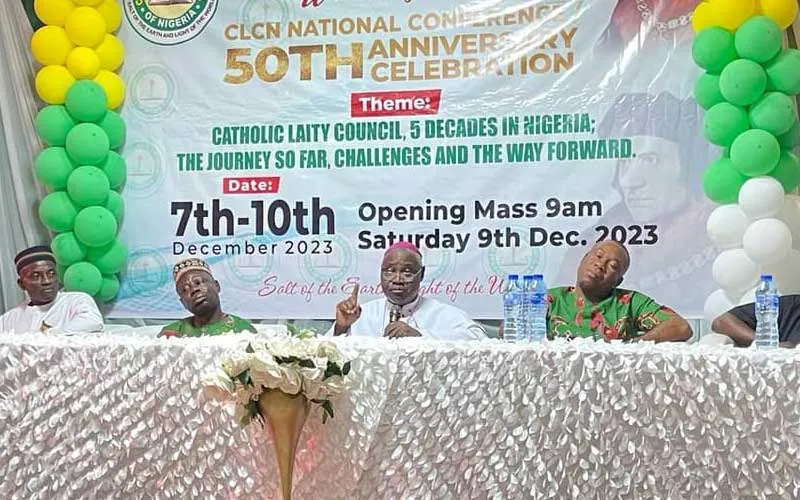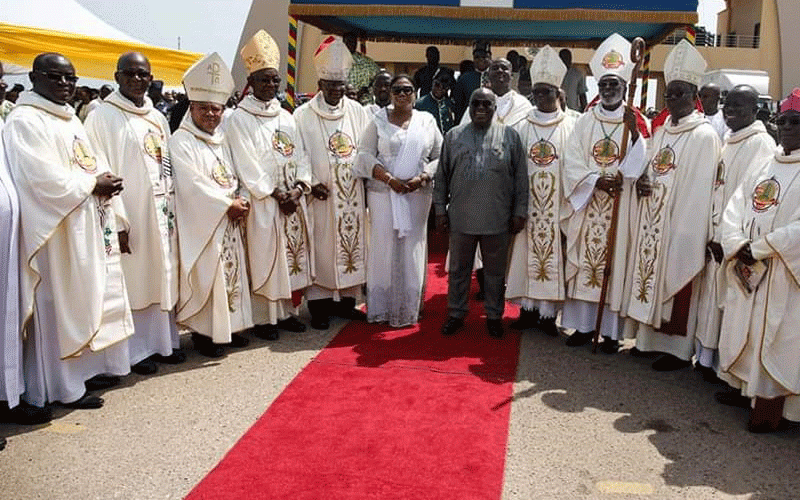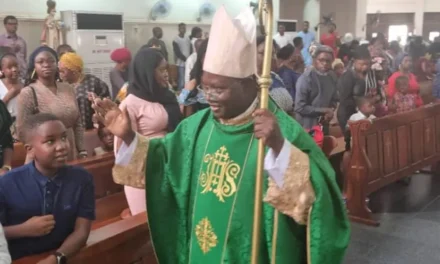The Catholic Church needs to prioritize the formation of the Laity to facilitate their growth in faith principles, Archbishop Ignatius Ayau Kaigama of Nigeria’s Abuja Archdioces, who was the previous President of RECOWA-CERAO has said.
In his keynote address on the occasion of the Golden Jubilee celebrations of the Catholic Laity Council of Nigeria (CLCN), Archbishop Kaigama listed what lay people “should own” to foster their formation in Catholic faith.
“The formation of the laity should be at the top of the to-do list of our Church,” the Nigerian Catholic Archbishop said at the Public Institute of Nigeria in his Metropolitan See during the four-day celebrations that concluded on December 10
The formation of the Laity includes catechesis across all age brackets, he said, adding that “the lay need to grow in the knowledge of the Catholic faith and the principles of morality.
To foster their personal formation in Catholic faith, Archbishop Kaigama said, “every Catholic literate adult should own a bible, a catechism of the Catholic Church, a code of canon law, the Vatican II document, and a prayer book.”
In his keynote address that was also published on his Facebook page on December 9, the Local Ordinary of Abuja since November 2019 went on to challenge parents and guardians to be at the forefront in the faith formation of their respective children.
When parents and guardians take the lead in Catholic faith formation, the archbishop said, their children will be able, “by their knowledge, their example, and their friendship, to evangelize the world around them and contribute in their own families to the growth of the Church.”
He emphasized the need for the family to be the first place for Catholic faith formation, adding that the institution of the family needs to be protected “at all costs” amid various contemporary threats, including “militant” feminism and Lesbian, Gay, Bisexual, Transgender, and Queer/Questioning (LGBTQ), among other societal issues
“You must also raise your children with the proper values and prepare them to enter a confusing and hostile world,” the 65-year-old Catholic Archbishop who started his Episcopal Ministry in April 1995 as Bishop of Nigeria’s Jalingo Diocese told parents and guardians during the Golden Jubilee of CLCN
He went on to caution sponsors at baptism, marriage, and confirmation against laxity, and encouraged them to journey with those they sponsor in their faith Catholic faith formation. Archbishop Kaigama encouraged the Laity to live up to their call to be missionaries, including, teaching and propagating good news by words and deeds, as well as offering oneself for mission and praying for the mission of the Church. “Empowering the laity doesn’t mean aping the clergy,” he said, and added, “Lay people are called to become more involved in the internal affairs of the Church, and not to remain the ‘sleeping giants’”.
A mature and well-informed Laity needs to be involved in the fight against the vices of ethnic division and corruption that are destructive to society, the Nigerian Catholic Archbishop said.
“Lay Catholics must also be more attentive to financial abuse in the Church; this does not only happen in government where bribery and corruption have become a culture,” he said, adding, “Sexual abuse isn’t the only scandal confronting the Catholic Church.”
Archbishop Kaigama went on to call upon the Laity to take up their co-responsibility role in the Church, and help address the challenge of clericalism, which he said manifests in “an exaggerated respect or deference to the clergy.”
He faulted a new form of clericalism, which he said involves “lay persons worrying themselves about who gets to be in the sanctuary during Mass or taking front seats in the church or serving as head of this or that church committee.” Archbishop Kaigama also reminded the Laity of their “baptismal responsibility to meet their civic obligations as private citizens or as public officials.”
The Catholic Church leader added that he found it regrettable that “many lay people are timid, indifferent, or ignorant about their faith even though they must carry out their mission in the ordinary surroundings of the world.”
- SYNODALITY FOR THE AFRICAN IS A REJECTION OF INDIVIDUALISM. - October 23, 2024
- THE ENCYCLICAL, TITLED DILEXIT NOS TO APPEAR SOON - October 22, 2024
- MESSAGE OF HIS HOLINESS POPE FRANCIS FOR WORLD MISSION DAY 2024 20 OCTOBER, 2024. - October 21, 2024






